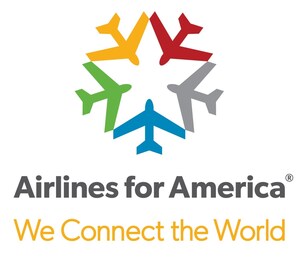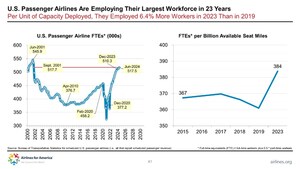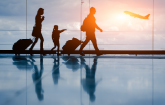A4A Unveils Details of National Airline Policy as Foundation to Sustained Profitability
WASHINGTON, Feb. 28, 2012 /PRNewswire-USNewswire/ -- Airlines for America (A4A), the industry trade organization for the leading U.S. airlines, today announced that the largest U.S. airlines earned a combined $390 million in 2011 or less than half a penny on every $1 of revenue generated for the year. Following more than $50 billion in losses accumulated in the preceding 10 years, A4A said this second consecutive year of meager profits underscores the need for a National Airline Policy that would help rationalize the industry's regulatory and tax environment, improve infrastructure and ensure that U.S. airlines can compete globally.
(Logo: http://photos.prnewswire.com/prnh/20111201/DC15444LOGO)
Unveiling details of its proposed National Airline Policy today, A4A said changes are needed to foster growth and sustained profitability, which will enable airlines to maintain good-paying jobs and service to communities, and to invest in their products.
"We have an opportunity to build on the industry's strong safety and operational performance and the recent passage of a long-term FAA reauthorization bill," said A4A President and CEO Nicholas E. Calio. "The commercial aviation industry creates more than 10 million good-paying U.S. jobs and drives more than $1 trillion in annual economic activity, and can do more to enable American businesses to connect to global markets if the government takes a holistic approach that addresses the fundamental tax, regulatory and infrastructure challenges that consistently undermine this industry in the United States."
2011 Financial Results
- Net profit: The $390 million profit (0.3 percent net margin) includes the results of 11 U.S. passenger airlines and represents an 86 percent drop from the $2.7 billion net profit (2.2 percent net margin) that these same carriers earned in 2010.
- Revenue and Expenses: Operating revenue grew 12.6 percent but expenses increased 15.5 percent. Fuel costs jumped 36.1 percent compared with 2010. Fuel remained the industry's largest cost at about 35 percent of total operating expenses, up from 30 percent in 2010.
- Customer Service: U.S. airlines reported the best performance ever in 2011 for three key customer-service metrics, including mishandled baggage and bumped passengers, as well as the best on-time arrival rate for any fourth quarter in history. Government data also shows that consumer complaints dropped in 2011 to 1.18 per 100,000 passengers, versus 1.20 in 2010.
National Airline Policy
With the recently signed long-term FAA reauthorization bill, Congress and the administration have an opportunity, working with the airline industry, to address long-overdue structural changes needed with a comprehensive National Airline Policy.
- Rationalize the Tax Burden: Airline customers today pay about $61 in taxes on a typical $300 domestic ticket, federal rates that are higher than those of alcohol and tobacco, products that are taxed to discourage use. Congress needs to hold the line on taxes and oppose future increases. A4A is advocating for the repeal of the jet-fuel tax imposed in 1993 as a temporary deficit-reduction measure as was done for other modes of transportation, and for no increases in Passenger Facility Charges and the passenger security fee. "Our customers are overburdened with taxes and airlines have been viewed as effective tax collectors for the federal government for far too long," Calio said.
- Rationalize the Regulatory Burden: Existing government regulations cost the industry billions of dollars per year, hampering their ability to grow, create new U.S. jobs and compete globally. Two recent consumer mandate regulations issued by the U.S. Department of Transportation will cost U.S. airlines $1.8 billion annually, with a third mandate expected this fall. Congress and the administration should promote regulatory reform to ensure that existing, pending and future regulations are based on sound science and vigorous cost/benefit analyses.
- Enhance Global Competitiveness: Without a National Airline Policy, U.S. airlines will continue to lose ground to their competitors around the world. Many other countries enact policies to support their airlines. The United States should continue its opposition to the EU Emissions Trading Scheme and work to enact a global approach to address worldwide aircraft emissions. The United States needs to remove limits on cross-border investment and address unfair competitive practices faced by U.S. airlines in global markets.
- Modernize and Reform Infrastructure: A National Airline Policy should focus on the most cost-beneficial projects, which can deliver immediate results with the equipment that airlines already have on their aircraft, including performance-based navigation procedures. The National Airline Policy also should work to reduce wait times for passenger security screening through a risk-based strategy.
- Mitigate Jet-Fuel Cost and Price Volatility: Rising fuel prices are clearly a concern for the industry again this year. A National Airline Policy should work to curb speculation in the oil futures market, promote commercially viable, sustainable alternative fuels and bolster domestic fuel supplies in an environmentally sound manner.
ABOUT A4A
Annually, commercial aviation helps drive more than $1 trillion in U.S. economic activity and more than 10 million U.S. jobs. A4A airline members and their affiliates transport more than 90 percent of all U.S. airline passenger and cargo traffic. For more information about the airline industry, visit www.airlines.org and follow us on Twitter @airlinesdotorg.
SOURCE Airlines for America
WANT YOUR COMPANY'S NEWS FEATURED ON PRNEWSWIRE.COM?
Newsrooms &
Influencers
Digital Media
Outlets
Journalists
Opted In





Share this article